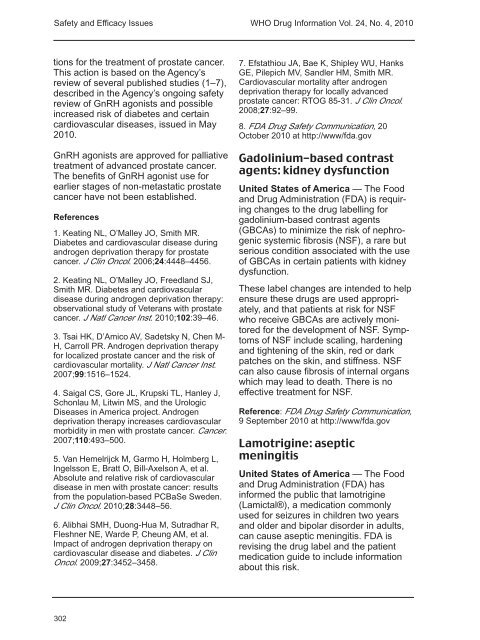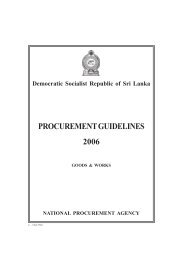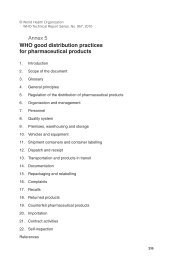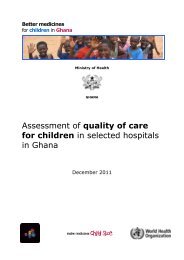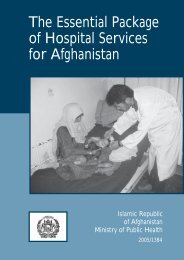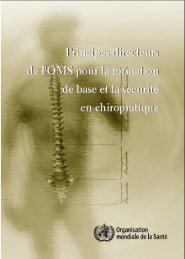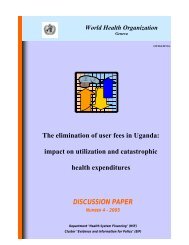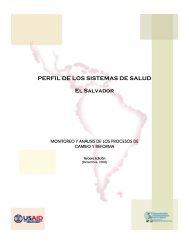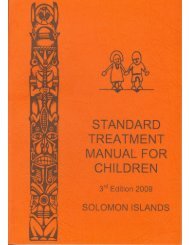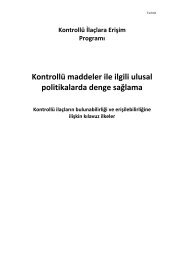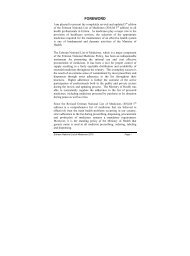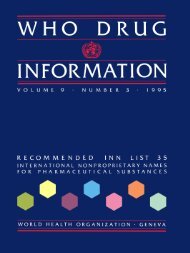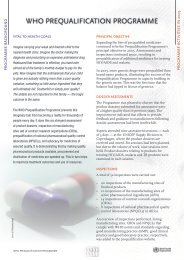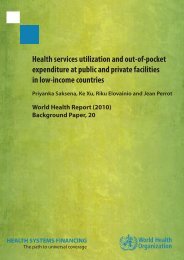WHO Drug Information Vol. 24, No. 4, 2010
WHO Drug Information Vol. 24, No. 4, 2010
WHO Drug Information Vol. 24, No. 4, 2010
You also want an ePaper? Increase the reach of your titles
YUMPU automatically turns print PDFs into web optimized ePapers that Google loves.
Safety and Efficacy Issues<strong>WHO</strong> <strong>Drug</strong> <strong>Information</strong> <strong>Vol</strong>. <strong>24</strong>, <strong>No</strong>. 4, <strong>2010</strong>tions for the treatment of prostate cancer.This action is based on the Agency’sreview of several published studies (1–7),described in the Agency’s ongoing safetyreview of GnRH agonists and possibleincreased risk of diabetes and certaincardiovascular diseases, issued in May<strong>2010</strong>.GnRH agonists are approved for palliativetreatment of advanced prostate cancer.The benefits of GnRH agonist use forearlier stages of non-metastatic prostatecancer have not been established.References1. Keating NL, O’Malley JO, Smith MR.Diabetes and cardiovascular disease duringandrogen deprivation therapy for prostatecancer. J Clin Oncol. 2006;<strong>24</strong>:4448–4456.2. Keating NL, O’Malley JO, Freedland SJ,Smith MR. Diabetes and cardiovasculardisease during androgen deprivation therapy:observational study of Veterans with prostatecancer. J Natl Cancer Inst. <strong>2010</strong>;102:39–46.3. Tsai HK, D’Amico AV, Sadetsky N, Chen M-H, Carroll PR. Androgen deprivation therapyfor localized prostate cancer and the risk ofcardiovascular mortality. J Natl Cancer Inst.2007;99:1516–15<strong>24</strong>.4. Saigal CS, Gore JL, Krupski TL, Hanley J,Schonlau M, Litwin MS, and the UrologicDiseases in America project. Androgendeprivation therapy increases cardiovascularmorbidity in men with prostate cancer. Cancer.2007;110:493–500.5. Van Hemelrijck M, Garmo H, Holmberg L,Ingelsson E, Bratt O, Bill-Axelson A, et al.Absolute and relative risk of cardiovasculardisease in men with prostate cancer: resultsfrom the population-based PCBaSe Sweden.J Clin Oncol. <strong>2010</strong>;28:3448–56.6. Alibhai SMH, Duong-Hua M, Sutradhar R,Fleshner NE, Warde P, Cheung AM, et al.Impact of androgen deprivation therapy oncardiovascular disease and diabetes. J ClinOncol. 2009;27:3452–3458.7. Efstathiou JA, Bae K, Shipley WU, HanksGE, Pilepich MV, Sandler HM, Smith MR.Cardiovascular mortality after androgendeprivation therapy for locally advancedprostate cancer: RTOG 85-31. J Clin Oncol.2008;27:92–99.8. FDA <strong>Drug</strong> Safety Communication, 20October <strong>2010</strong> at http://www/fda.govGadolinium-based contrastagents: kidney dysfunctionUnited States of America — The Foodand <strong>Drug</strong> Administration (FDA) is requiringchanges to the drug labelling forgadolinium-based contrast agents(GBCAs) to minimize the risk of nephrogenicsystemic fibrosis (NSF), a rare butserious condition associated with the useof GBCAs in certain patients with kidneydysfunction.These label changes are intended to helpensure these drugs are used appropriately,and that patients at risk for NSFwho receive GBCAs are actively monitoredfor the development of NSF. Symptomsof NSF include scaling, hardeningand tightening of the skin, red or darkpatches on the skin, and stiffness. NSFcan also cause fibrosis of internal organswhich may lead to death. There is noeffective treatment for NSF.Reference: FDA <strong>Drug</strong> Safety Communication,9 September <strong>2010</strong> at http://www/fda.govLamotrigine: asepticmeningitisUnited States of America — The Foodand <strong>Drug</strong> Administration (FDA) hasinformed the public that lamotrigine(Lamictal®), a medication commonlyused for seizures in children two yearsand older and bipolar disorder in adults,can cause aseptic meningitis. FDA isrevising the drug label and the patientmedication guide to include informationabout this risk.302


